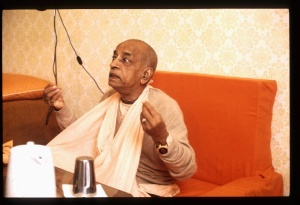BG 1.24: Difference between revisions
(Vanibot #0020 edit - link to the Version Compare feature) |
(Vanibot #0054 edit - transform synonyms into clickable links, which search similar occurrences (split by space character)) |
||
| (One intermediate revision by the same user not shown) | |||
| Line 24: | Line 24: | ||
<div class="synonyms"> | <div class="synonyms"> | ||
''sañjayaḥ uvāca'' | ''[//vanipedia.org/wiki/Special:VaniSearch?s=sañjayaḥ&tab=syno_o&ds=1 sañjayaḥ] [//vanipedia.org/wiki/Special:VaniSearch?s=uvāca&tab=syno_o&ds=1 uvāca]'' — Sañjaya said; ''[//vanipedia.org/wiki/Special:VaniSearch?s=evam&tab=syno_o&ds=1 evam]'' — thus; ''[//vanipedia.org/wiki/Special:VaniSearch?s=uktaḥ&tab=syno_o&ds=1 uktaḥ]'' — addressed; ''[//vanipedia.org/wiki/Special:VaniSearch?s=hṛṣīkeśaḥ&tab=syno_o&ds=1 hṛṣīkeśaḥ]'' — Lord Kṛṣṇa; ''[//vanipedia.org/wiki/Special:VaniSearch?s=guḍākeśena&tab=syno_o&ds=1 guḍākeśena]'' — by Arjuna; ''[//vanipedia.org/wiki/Special:VaniSearch?s=bhārata&tab=syno_o&ds=1 bhārata]'' — O descendant of Bharata; ''[//vanipedia.org/wiki/Special:VaniSearch?s=senayoḥ&tab=syno_o&ds=1 senayoḥ]'' — of the armies; ''[//vanipedia.org/wiki/Special:VaniSearch?s=ubhayoḥ&tab=syno_o&ds=1 ubhayoḥ]'' — both; ''[//vanipedia.org/wiki/Special:VaniSearch?s=madhye&tab=syno_o&ds=1 madhye]'' — in the midst; ''[//vanipedia.org/wiki/Special:VaniSearch?s=sthāpayitvā&tab=syno_o&ds=1 sthāpayitvā]'' — placing; ''[//vanipedia.org/wiki/Special:VaniSearch?s=ratha&tab=syno_o&ds=1 ratha]-[//vanipedia.org/wiki/Special:VaniSearch?s=uttamam&tab=syno_o&ds=1 uttamam]'' — the finest chariot. | ||
</div> | </div> | ||
Latest revision as of 16:13, 17 February 2024

A.C. Bhaktivedanta Swami Prabhupada
TEXT 24
- सञ्जय उवाच
- एवमुक्तो हृषीकेशो गुडाकेशेन भारत ।
- सेनयोरुभयोर्मध्ये स्थापयित्वा रथोत्तमम् ॥२४॥
- sañjaya uvāca
- evam ukto hṛṣīkeśo
- guḍākeśena bhārata
- senayor ubhayor madhye
- sthāpayitvā rathottamam
SYNONYMS
sañjayaḥ uvāca — Sañjaya said; evam — thus; uktaḥ — addressed; hṛṣīkeśaḥ — Lord Kṛṣṇa; guḍākeśena — by Arjuna; bhārata — O descendant of Bharata; senayoḥ — of the armies; ubhayoḥ — both; madhye — in the midst; sthāpayitvā — placing; ratha-uttamam — the finest chariot.
TRANSLATION
Sañjaya said: O descendant of Bharata, having thus been addressed by Arjuna, Lord Kṛṣṇa drew up the fine chariot in the midst of the armies of both parties.
PURPORT
In this verse Arjuna is referred to as Guḍākeśa. Guḍākā means sleep, and one who conquers sleep is called guḍākeśa. Sleep also means ignorance. So Arjuna conquered both sleep and ignorance because of his friendship with Kṛṣṇa. As a great devotee of Kṛṣṇa, he could not forget Kṛṣṇa even for a moment, because that is the nature of a devotee. Either in waking or in sleep, a devotee of the Lord can never be free from thinking of Kṛṣṇa's name, form, qualities and pastimes. Thus a devotee of Kṛṣṇa can conquer both sleep and ignorance simply by thinking of Kṛṣṇa constantly. This is called Kṛṣṇa consciousness, or samādhi. As Hṛṣīkeśa, or the director of the senses and mind of every living entity, Kṛṣṇa could understand Arjuna's purpose in placing the chariot in the midst of the armies. Thus He did so, and spoke as follows.